牛津译林版(2019)必修 第二册Unit 2 Be sporty,be healthy Extended reading 课件(共68张PPT)
文档属性
| 名称 | 牛津译林版(2019)必修 第二册Unit 2 Be sporty,be healthy Extended reading 课件(共68张PPT) | 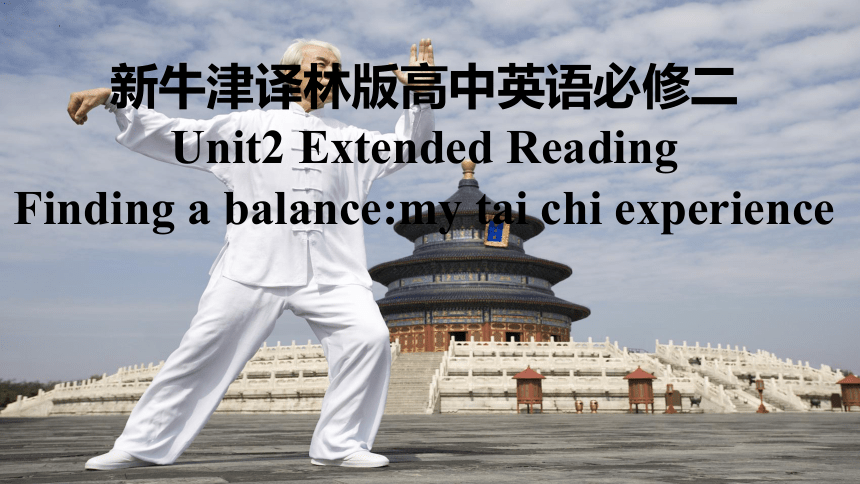 | |
| 格式 | pptx | ||
| 文件大小 | 14.8MB | ||
| 资源类型 | 教案 | ||
| 版本资源 | 牛津译林版(2019) | ||
| 科目 | 英语 | ||
| 更新时间 | 2023-07-11 16:43:31 | ||
图片预览


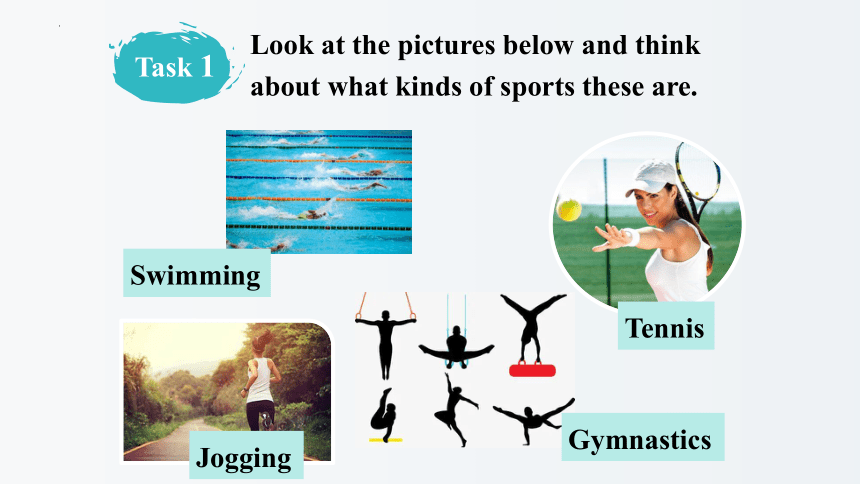
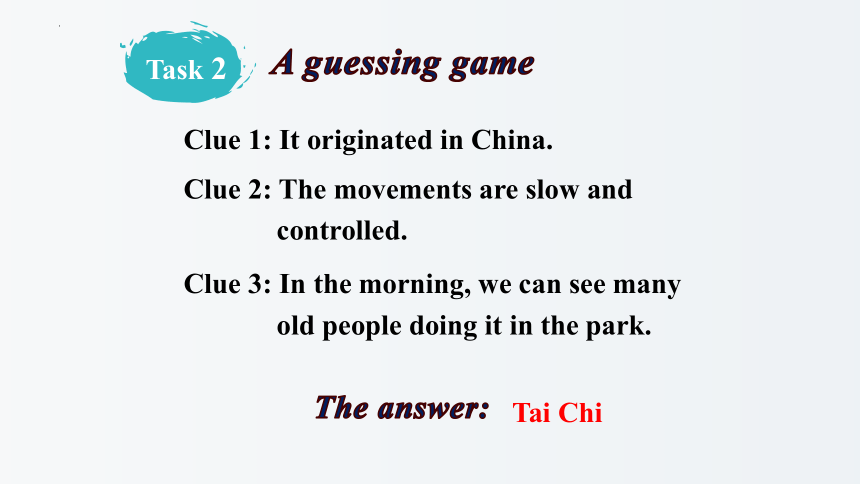
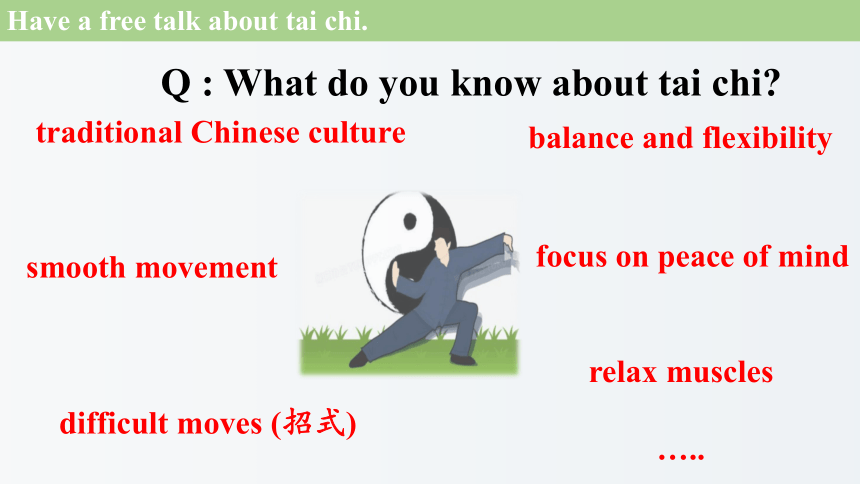
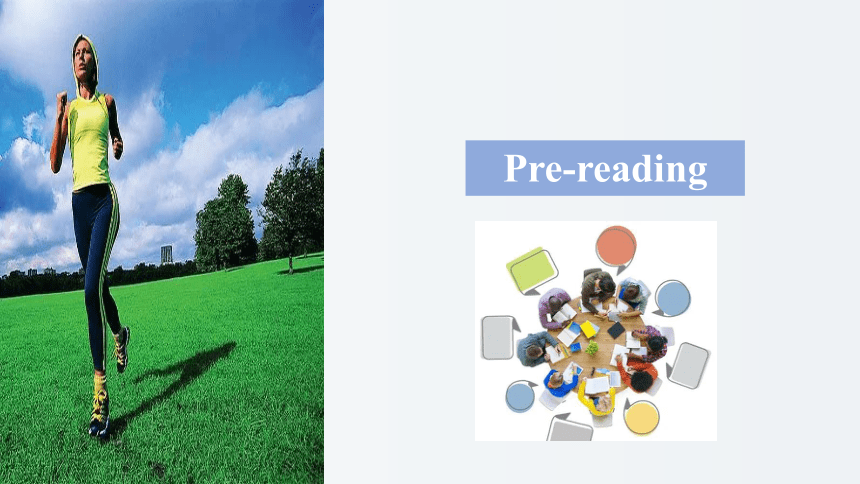
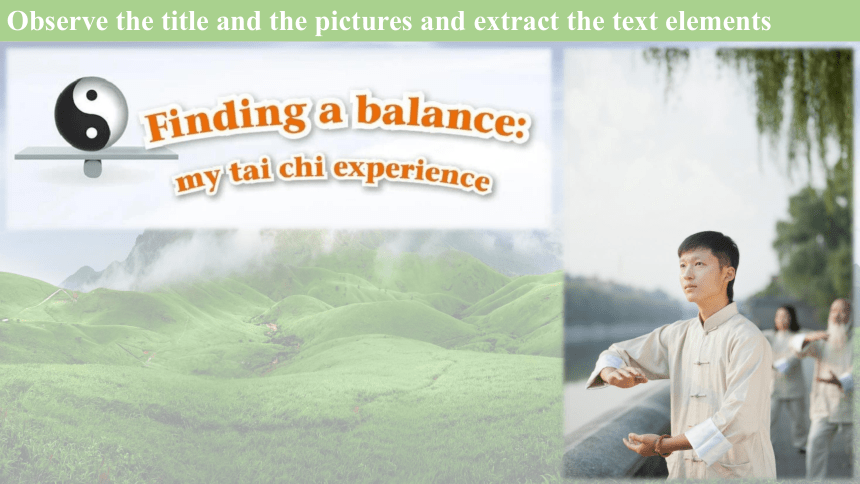
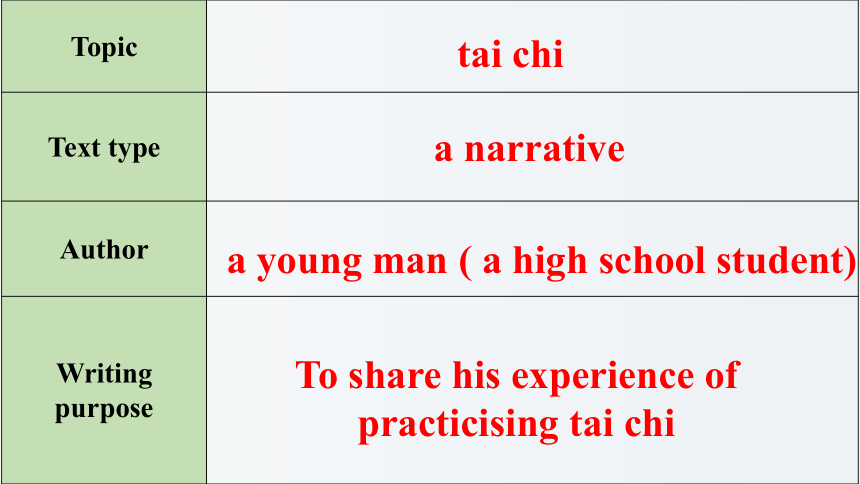
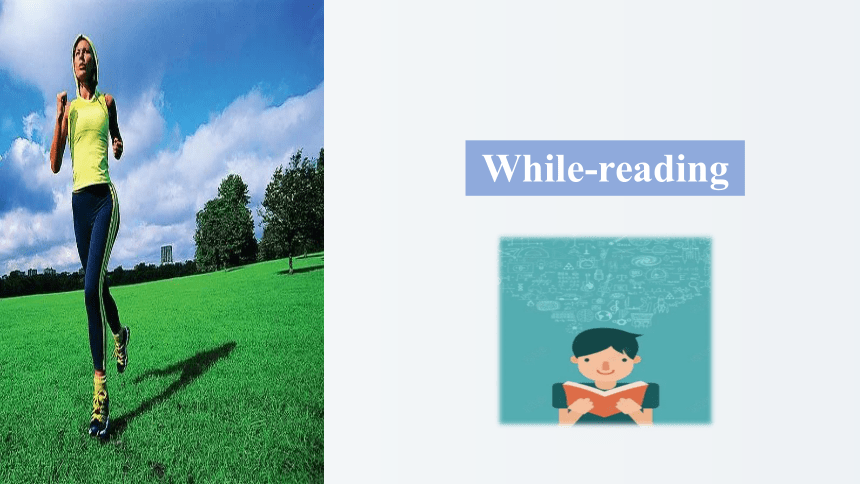
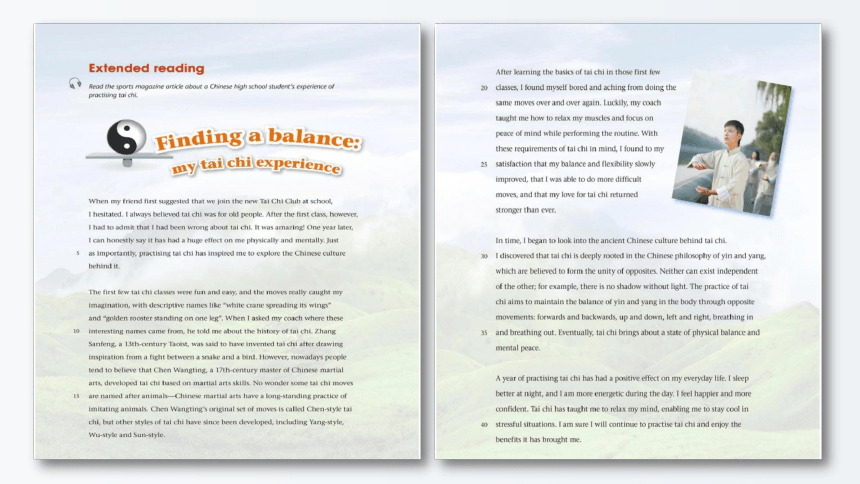
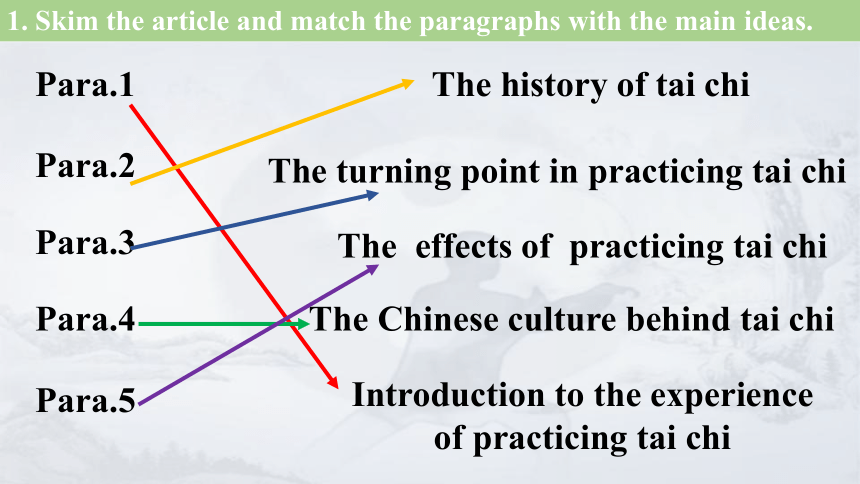
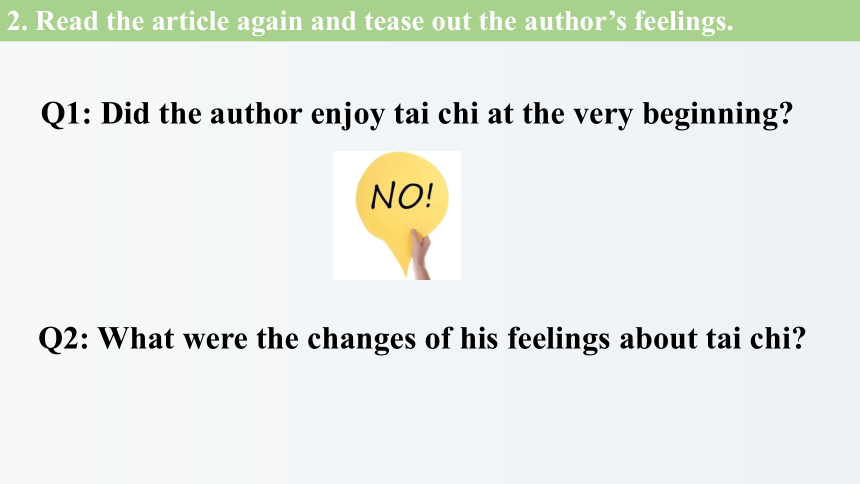
文档简介
(共68张PPT)
新牛津译林版高中英语必修二
Unit2 Extended Reading
Finding a balance:my tai chi experience
Lead-in
Look at the pictures below and think about what kinds of sports these are.
Swimming
Gymnastics
Tennis
Jogging
Task 1
A guessing game
Clue 1: It originated in China.
Clue 3: In the morning, we can see many
old people doing it in the park.
Clue 2: The movements are slow and
controlled.
The answer:
Tai Chi
Task 2
…..
Q : What do you know about tai chi
traditional Chinese culture
smooth movement
difficult moves (招式)
balance and flexibility
relax muscles
focus on peace of mind
Have a free talk about tai chi.
Pre-reading
Observe the title and the pictures and extract the text elements
Topic
Text type
Author
Writing purpose
a narrative
a young man ( a high school student)
tai chi
To share his experience of
practicising tai chi
While-reading
1. Skim the article and match the paragraphs with the main ideas.
Para.1
Para.2
Para.3
Para.4
Para.5
Introduction to the experience
of practicing tai chi
The history of tai chi
The turning point in practicing tai chi
The Chinese culture behind tai chi
The effects of practicing tai chi
2. Read the article again and tease out the author’s feelings.
Q1: Did the author enjoy tai chi at the very beginning
Q2: What were the changes of his feelings about tai chi
1._________ to join Tai Chi Club.
Feelings about tai chi
Found the first few classes 2.______ and 3.______.
Felt 4._______ and 5.______ from repeating moves.
Felt 6.___ and had 7.____love for it after following the requirements.
Feel more 8._________, 9.__________and 10.____________.
Be willing to 11.____________ to practice tai chi.
Hesitated
fun
easy
bored
ached
satisfied
stronger
energetic
happier
confident
continue
What are the two different explanations for
the origin of tai chi
2. Why was the author interested in tai chi in his
first few classes
3. Besides the two moves mentioned in the
passage, do you know any other moves in tai
chi with descriptive names
3.Read Para.2 and answer the questions.
What are the two different explanations for
the origin of tai chi
Zhang Sanfeng, a 13th-century Taoist, was said to have invented tai chi after drawing inspiration from a fight between a snake and a bird.
Nowadays people tend to believe that Chen Wangting, a 17th-century master of Chinese martial arts, developed tai chi based on martial arts skills.
2. Why was the author interested in tai chi in his
first few classes
Because they were fun and easy, and the moves with descriptive names caught his imagination.
white crane spreading its wings
Golden rooster
standing on one leg
3. Do you know any other moves in tai chi with
descriptive names
Part the Wild Horse’s Mane on Both Side
左右野马分鬃
Grasping sparrow tail 揽雀尾
…
White crane spreading its wings (白鹤亮翅)
Golden rooter standing on one leg (金鸡独立)
Parting the wild horse mane(野马分鬃)
Grasping sparrow tail
(揽雀尾)
A close relationship
between human and _______
nature
4.Read Para.4 and discuss in pairs.
Q1: What is the philosophy of yin and yang
Form the unity of opposites.
Be independent of each other.
No shadow, no light.
Q2:How does tai chi help people maintain the balance of yin and yang in the body
Through opposite movements
forwards and backwards
up and down
left and right
breathing in and breathing out
A state of
physical and _______peace
mental
Read paragraph 4 and complete the chart.
Essence of tai chi
Chinese philosophy of (1) ______________
the unity of (2) ______________
the practice of tai chi aims to _______
_________________
_______________ __________ (3)
(4) ___________________
(5) ___________________
(6) ___________________
breathing in and breathing out
yin and yang
opposites
forwards and backwards
up and down
left and right
the balance in the body
through opposite
maintain
movements
5.Read Para.5 and fill in the blanks.
The benefits of tai chi
1._________ better at night.
2.______________ your mind.
Staying 3.___________ in stressful situations.
Sleeping
Relaxing
cool
Q: In your view, what other benefits does tai chi have
A positive and peaceful
________ towards life.
attitude
A close relationship
between human and nature
A state of
physical and mental peace.
A positive and peaceful attitude towards life.
a. I had to admit that I had been wrong about tai chi.
b. I found myself bored and aching from doing the same
moves over and over again.
c. I found to my satisfaction that my balance and flexibility
slowly improved.
d. When my friend first suggested that we join the new
Tai Chi Club at school, I hesitated.
e. The first few tai chi classes were fun and easy, and the
moves really caught my imagination.
Task 5
Read through the whole passage and put the following sentences in order.
d
The answer:
a
e
b
c
Post-reading
1.Discuss in groups.
“ I always believed that tai chi was for old people.”
(Line 2, Para.1)
Q1: Do you agree with the opinion Why or why not
Q2: If there is a Tai Chi Club in our school,
would you like to join Why or why not
2. Make a poster for a new Tai Chi Club.
A new Tai Chi Club will be started. Please make a poster for it
so that more students in our school will join the club. Make sure
that your poster includes:
A brief introduction to tai chi.
e.g. the history / philosophy / benefits of tai chi
2. Reasons for recommendation.
(You can also draw some pictures about tai chi if you like.)
Tai Chi Club
Do you have problems sleeping at night Do you often feel tired Are you stressed about your school life If so, why not join our Tai Chi Club!
By practicing tai chi, you can sleep better at night, feel more energetic and confident. Also, it can help you relax your body and mind and enables you to stay cool in stressful situations.
Our classes are fun and easy and a professional coach will guide you to practice tai chi. What are you waiting for Come and join us!
A sound mind starts from a sound body.
How can a weak body develop a sound mind
—— Cai Yuanpei
Language Points
1 When my friend suggested that we join the new Tai Chi Club at school, I hesitated.
① suggest / advise / command /demand 等表示“建议、命令、要求”等含义的动词+宾语从句时,从句中的谓语使用 (should) +动词原形,虚拟语气。
一个坚持 两个命令 三个建议 四个要求
1). insist 2). order, command 3). advise, suggest, propose 4). demand, require, request, desire
He ordered that all the troops (should) charge forward.
他命令所有部队冲锋。
He suggested that the child (should) get up at 6.
他建议孩子6点起床。
Tom insists that the wife do housework.
汤姆坚持要求妻子做家务。
② hesitate
vi. 犹豫,迟疑
adj. 犹豫的;踌躇的
n. 犹豫;踌躇
hesitating
hesitation
She the child's feelings.
她不想伤害孩子的感情。
hesitated to hurt
There is no room for . 没有犹豫的余地。
hesitation
2 After the first class, however, I had to admit that I had been wrong about tai chi.
admit vt. & vi. 承认;招认;准许进入;准许加入
过去式: admitted 过去分词: admitted 现在分词: admitting
n.
admission 承认;入会费;许可
Embassy security personnel refused to .
使馆保安人员拒绝让他或他的妻子进入。
He the money but promised never to do it again.
他承认拿了钱,但他保证再不干这样的事了。
admit him or his wife
admitted taking
be wrong about
对... 的看法是错误的;误解
It is quite remarkable
that doctors about this.
医生们对此有过如此错误的认识真是很不寻常。
have been so wrong
3 One year later, I can honestly say it has had a huge effect on me physically and mentally.
physically and mentally
身体上和精神上
You may be physically and mentally exhausted
after a long flight.
长途飞行后你可能身心都很疲惫。
《柯林斯英汉双解大词典》
4 The first few tai chi classes were fun and easy, and the moves really caught my imagination, with descriptive names like “white crane spreading its wings” and “golden rooster standing on one leg”.
前几节太极拳课很好玩,也不难学,这些动作有着像“白鹤亮翅”“金鸡独立”这样画面感很强的名称,实在令我着迷。
catch one's imagination
抓住某人的想象力,
引起某人的兴趣
white crane spreading its wings
golden rooster standing on one leg 归纳提炼其结构“名词/代词+doing”
名词 / 代词 + 现在分词, 现在分词表示前面的名词或代词主动进行的动作或状态等。
独立主格结构
The man lay there, his hands trembling.
So many students being absent, the meeting had to be put off.
His homework having been done, Tom went to sleep.
独立主格结构的逻辑主语与句子的主语不同,它独立存在;
独立主格结构中的名词或代词与后面的现在分词之间是主谓关系;
独立主格结构一般在句子起状语的作用,有逗号与主句分开。
5 Zhang Sanfeng, a 13th-century Taoist, was said to have invented tai chi after drawing inspiration from a fight between a snake and a bird.
Sb. / Sth. +be (is /was) said +动词不定式 该句型 是 It is /was said that 从句 的变化,
具体情况是 将that从句中的主语sb./ sth. 提取出来做 全句的主语,that 从句不再存在,而代之以动词不定式结构。
It was said that Zhang invented….
Zhang was said to have invented …
据说,张三丰发明了……
结构一: sb. /sth. be said + 不定式一般式(to do)
表示不定式所表示的动作尚未发生或即将发生。
They are said to leave soon. 据说她们很快就要离开。
He is said to move to the South this winter.
据说他今年冬天要搬到南方去。
有时候,不表示将来,而表示一般情况(尤其是当不定式表示状态而不是动作时)
This friend of hers is said to be very rich.
她的这个朋友据说很有钱。
His company is said to be in trouble.
据说他的公司遇到了困难。
结构二: sb. / sth. + be said + 不定式进行式(to be doing) 表示动作正在进行。
He is said to be doing fine at school.
据说他在学校表现很好。
The children are said to be playing by the river.
据说孩子们正在河边玩。
结构三:sb. / sth. + be said + 不定式完成式 (to have done ) 表示 动作已经完成。
They are said to have left London.
据说他们已经离开伦敦。
Mr. Brown is said to have died of liver cancer.
据说布朗先生已经死于肝癌。
1 Leonardo Da Vinci birds kept in cages in order to have the pleasure of setting them free.
A is said to be buying B is said to have bought
C had said to buy D has said to have bought
2 AIDS is said the biggest health challenge to both men and women in that area over the past few years.
A that it is B to be
C that it has been D to have been
3 –Is Bob still performing
–I’m afraid not. He is said the stage already as he has become an official.
A to have left B to leave
C to have been left D to be left
B
D
A
与 “sb. / sth. be said + 不定式”结构相似的还有
“sb. / sth. believed/ reported/ supposed/ thought + 不定式”等,其用法与搭配 大致相同。
She is believed to be staying with her aunt.
人们相信(可以相信)她正住在她姑姑家里。
He is reported to have been chosen chairman of the trade union.
据报道,他当选了工会主席。
Thousands of people were supposed to be working as slaves there.
据推测(人们推测),数以千计的人在那里做奴隶。
1 In some countries, thirteen an unlucky number.
A is believed being B is believed to be
C believes to be D believes being
2 Robert is said one of my classmates the other day, but I don’t know who she is.
A to marry B to have married
C to be marrying D being married
3 He is thought another TV play last year.
A to write B to be writing
C to have written D to have been writing
B
B
C
5 Zhang Sanfeng, a 13th-century Taoist, was said to have invented tai chi after a fight between a snake and a bird.
drawing inspiration from
从……得到启示
drawing inspiration from
Poets and artists often draw (get) their inspiration
from nature.
诗人和艺术家往往从大自然中获得灵感。
draw 过去式: drew 过去分词: drawn
6 However, nowadays people tend to believe that Chen Wangting, a 17th-century master of Chinese martial arts, developed tai chi based on martial arts skills.
不过,现在人们往往认为,太极拳是由17世纪的中国武术大师陈王廷在武术套路的基础上创编的。
① nowadays
adv. 现今,现在
用于把现在的情况与过去的情况进行对比,含有强烈的感彩,一般不用于完成时态。
nowadays在句中一般用作状语,可放在句首,也可放在句子中间或句末。
nowadays有时也可放在名词之后作定语。
Nowadays parents attach great importance to the education of their children.
当今,父母非常重视子女的教育。
这对现在的人是一个非常重要的事情。
That is a very important thing for people nowadays.
② tend to believe 往往会相信
tend to do sth. 倾向于做某事
Women in physics classes tend to do more poorly than men on exams.
在物理班里,女同学在考试方面相比男同学表现的差一些。
Men tend to put on weight in middle age.
男人到了中年体重往往会增加。
③ master n. 大师,能手;主人
vt. 精通,掌握;控制
O. Henry was a master of the short story.
欧●亨利是短篇小说 。
It didn’t take him long to master the local language and make some friends.
没过多久,他就 当地的语言,还交了一些朋友。
大师
掌握了
④ based on martial arts skills 在武术套路的基础上
be based on… “根据; 以 ... 为基准” ,作 谓语
based on… 作状语
The TV play was based on real life.
那出电视剧是根据现实生活写成的。
With our knowledge based on practice,
we can make contributions to our society.
相当于:
With our knowledge which is based on practice,
we can make contributions to our society.
(our knowledge与practice是被动关系)
his study on the foundation of hard work , Jack has made gradual progress this term.
on the foundation of hard work ,
Jack's study has got better this term.
Jack's study , on the foundation of hard work , has got better this term.
【Basing】
【Based】
【based】
用 base 的恰当形式填空
7 No wonder some tai chi moves are named after animals—Chinese martial arts have a long-standing practice of imitating animals.
① no wonder 不足为奇,并不奇怪 (难怪; 怪不得)
It is no wonder that + 主语从句 难怪,…
No wonder the Chinese are said to be hospitable.
怪不得,人们说中国人很好客。
② be named after
以……名字命名
Tasmania was named after its discoverer, A. J. Tasman.
塔斯曼尼亚岛是以其发现者塔斯曼的名字命名的。
③ a long-standing practice
长期以来的做法
④ imitate vt. 模仿;仿效
imitator n. 模仿者 imitation n . 模仿;效法
8 Chen Wangting’s original set of moves is called Chen-style tai chi, but…
original adj. 原始的;最初的
n. 起源;出身
v. 起源于
origin
originate
a set of moves
一套动作
9 …I found myself bored and aching from doing the same moves over and over again.
① find oneself + 宾补( doing / done / adj. / prep短语等) 发现自己处在某种境地
When he came to himself, he found himself by a group of boys. (surround)
A cook will be immediately fired if he is found ____ in the kitchen. (smoke)
surrounded
smoking
bore vt. 使厌烦; ache vi. 疼痛
② over and over again
一再; 再三; 反复不断地
over and over again 一再 over and over 再三
time and again 多次 again and again 反复地
Luckily, my coach taught me how to relax my muscles and focus on peach of mind
while performing the routine.
内心的宁静
① peach of mind
She will have no peace of mind until she's apologized and been forgiven.
除非她道歉并得到谅解,否则,她的心灵将是无法安宁下来的。
② while performing
属于状语从句省略主语和be动词的省略用法 。
While (she was) listening to the radio, she fell asleep.
While (you are) asked to answer the question, please speak louder.
While 引导的状语从句,如果主句和从句的主语一致,且从句谓语又含有be,则从句中有时可以省略主语和be, while后可以直接跟doing, done, …
He hurt himself while playing basketball.
11 With these requirements of tai chi in mind, I found to my satisfaction that my balance and flexibility slowly improved, that I was able to do more difficult moves, and that my love for tai chi returned stronger than ever.
① with+名词(宾语)+介词短语 (宾补),作 状语。
with+ 宾语 + 介词短语
with+宾语 + 过去分词done
(宾语和宾补之间是被动关系)
with+宾语 + 现在分词doing
(宾语和宾补之间是动宾关系)
with+宾语 + to do
(不定式作宾补有“将来”的意思)
with+宾语 + 形容词/副词
with复合结构在句中常做状语
Every day, our teacher came into the classroom with many books in her hand.
每天老师进教室的时候手里都拿着很多书。(伴随状语)
All the day he worked with the door closed.
一整天他都关着门工作。(伴随状语)
With the kind girl leading us, we had no difficulty finding the library.
有那个善良的女孩带领我们,我们毫不费劲地找到了图书馆。
(原因状语)
With much homework to do tonight, I can’t go out with you.
今晚有这么多的作业要做,我不能和你出去了。(原因状语)
It’s not polite to speak with the mouth full.
说话时满嘴都是吃的是不礼貌的。(方式状语)
② to one’s satisfaction 使某人满意的是,作 插入成分。
The problem was solved to the complete satisfaction of everybody.
这件事情解决了,所有人都非常满意。
③ found that…, that…, and that…
三个that引导的宾语从句是并列关系,第一个that可以省略,但随后两个that不可省略。
传统语法认为当两个或多个由that 引导的宾语从句并列使用时,即使省略第一个 that,通常也不宜省略后面引导宾语从句的 that。
I asked her why and she told me that they were so quiet, that she was the only person talking in class and that it felt like the children were punishing her by making her talk to the walls!
她告诉了我三个内容:
一是 说他们(应该是指学生)很安静;
二是 说课堂上只有她一个人在说话,
三是 说给人的感觉像是他们在罚她对着墙壁说话。
12 In time, I began to look into the ancient Chinese culture behind tai chi.
向…里面看,浏览,窥视,调查,
及时,按时,适时;终于,最后
in time
look into
13 I discovered that tai chi is deeply rooted in the Chinese philosophy of yin and yang, which are believed to form the unity of opposites.
① be rooted in 根源在于,由……产生
The feeling of insecurity is often deeply rooted in children.
这种不安全感常常起源于童年,根深蒂固。
② philosophy n. 哲学
philosopher n. 哲学家; 思想家; 达观者
③ the unity of opposites
对立的统一
④ …which are believed to form…
属于 sb. / sth. be (is / was) + believed + 不定式
结构,类似于 sb. / sth. + is (was) + said + 不定式
结构。
14 Neither can exist independent of the other; for example, there is no shadow without light.
(两者)彼此不能独立存在;比如,没有光就没有影子。
exist vi. 存在;生活,生存
n. 存在;生存;
adj. 存在的;目前的;现行的
existence
existent
exist多用作不及物动词; 无被动,且不用于进行时。
exist常与介词by或on连用,表示“生存的手段或方法”
Do you believe that God exists
你相信有神的存在吗
There always exists a force of attraction between two bodies.
两个物体间永远存在着引力。
come into existence 成立, 建立
15 The practice of tai chi aims to maintain the balance of yin and yang in the body through opposite movements: forwards and backwards, up and down, left and right, breathing in and breathing out.
练习太极拳旨在通过一些相对的动作---进退、上下、左右、吐纳---来维持人体内部的阴阳调和。
breathing in and breathing out 采用breathing形式的原因?
与前面三组对应,充当through opposite movements 的补充说明,作状语。
16 Eventually,tai chi brings about a state of physical balance and mental peace.
最终,太极拳可以带来一种身心平衡的状态。
bring about 造成,引起
Science has brought about many changes in our lives.
科学为我们生活带来了很多变化。
bring up 教育;养育;呕出
bring out 拿出;出版, 产生;使出现
bring back 带回;归还;使回忆起;恢复
Please bring my notebook from the classroom.
The couple contrived to bring their children on a small income.
She was so shocked that she could hardly bring
a word.
从 up, out, back 中选择填空。
up
out
back
17 A year of pracising tai chi has had a positive effect on my everyday life.
一年练习太极拳的经历已经对我的日常生活产生了积极的作用。
18 I sleep better at night, and I am more energetic during the day. I feel happier and more confident.
晚上我睡得更香,白天则精力更充沛。幸福感倍增,人也更加自信。
19 Tai chi has taught me to relax my mind, enabling me to stay cool in stressful situations.
太极拳让我学会了放松心态,使我在有压力的环境下也能冷静应对。
新牛津译林版高中英语必修二
Unit2 Extended Reading
Finding a balance:my tai chi experience
Lead-in
Look at the pictures below and think about what kinds of sports these are.
Swimming
Gymnastics
Tennis
Jogging
Task 1
A guessing game
Clue 1: It originated in China.
Clue 3: In the morning, we can see many
old people doing it in the park.
Clue 2: The movements are slow and
controlled.
The answer:
Tai Chi
Task 2
…..
Q : What do you know about tai chi
traditional Chinese culture
smooth movement
difficult moves (招式)
balance and flexibility
relax muscles
focus on peace of mind
Have a free talk about tai chi.
Pre-reading
Observe the title and the pictures and extract the text elements
Topic
Text type
Author
Writing purpose
a narrative
a young man ( a high school student)
tai chi
To share his experience of
practicising tai chi
While-reading
1. Skim the article and match the paragraphs with the main ideas.
Para.1
Para.2
Para.3
Para.4
Para.5
Introduction to the experience
of practicing tai chi
The history of tai chi
The turning point in practicing tai chi
The Chinese culture behind tai chi
The effects of practicing tai chi
2. Read the article again and tease out the author’s feelings.
Q1: Did the author enjoy tai chi at the very beginning
Q2: What were the changes of his feelings about tai chi
1._________ to join Tai Chi Club.
Feelings about tai chi
Found the first few classes 2.______ and 3.______.
Felt 4._______ and 5.______ from repeating moves.
Felt 6.___ and had 7.____love for it after following the requirements.
Feel more 8._________, 9.__________and 10.____________.
Be willing to 11.____________ to practice tai chi.
Hesitated
fun
easy
bored
ached
satisfied
stronger
energetic
happier
confident
continue
What are the two different explanations for
the origin of tai chi
2. Why was the author interested in tai chi in his
first few classes
3. Besides the two moves mentioned in the
passage, do you know any other moves in tai
chi with descriptive names
3.Read Para.2 and answer the questions.
What are the two different explanations for
the origin of tai chi
Zhang Sanfeng, a 13th-century Taoist, was said to have invented tai chi after drawing inspiration from a fight between a snake and a bird.
Nowadays people tend to believe that Chen Wangting, a 17th-century master of Chinese martial arts, developed tai chi based on martial arts skills.
2. Why was the author interested in tai chi in his
first few classes
Because they were fun and easy, and the moves with descriptive names caught his imagination.
white crane spreading its wings
Golden rooster
standing on one leg
3. Do you know any other moves in tai chi with
descriptive names
Part the Wild Horse’s Mane on Both Side
左右野马分鬃
Grasping sparrow tail 揽雀尾
…
White crane spreading its wings (白鹤亮翅)
Golden rooter standing on one leg (金鸡独立)
Parting the wild horse mane(野马分鬃)
Grasping sparrow tail
(揽雀尾)
A close relationship
between human and _______
nature
4.Read Para.4 and discuss in pairs.
Q1: What is the philosophy of yin and yang
Form the unity of opposites.
Be independent of each other.
No shadow, no light.
Q2:How does tai chi help people maintain the balance of yin and yang in the body
Through opposite movements
forwards and backwards
up and down
left and right
breathing in and breathing out
A state of
physical and _______peace
mental
Read paragraph 4 and complete the chart.
Essence of tai chi
Chinese philosophy of (1) ______________
the unity of (2) ______________
the practice of tai chi aims to _______
_________________
_______________ __________ (3)
(4) ___________________
(5) ___________________
(6) ___________________
breathing in and breathing out
yin and yang
opposites
forwards and backwards
up and down
left and right
the balance in the body
through opposite
maintain
movements
5.Read Para.5 and fill in the blanks.
The benefits of tai chi
1._________ better at night.
2.______________ your mind.
Staying 3.___________ in stressful situations.
Sleeping
Relaxing
cool
Q: In your view, what other benefits does tai chi have
A positive and peaceful
________ towards life.
attitude
A close relationship
between human and nature
A state of
physical and mental peace.
A positive and peaceful attitude towards life.
a. I had to admit that I had been wrong about tai chi.
b. I found myself bored and aching from doing the same
moves over and over again.
c. I found to my satisfaction that my balance and flexibility
slowly improved.
d. When my friend first suggested that we join the new
Tai Chi Club at school, I hesitated.
e. The first few tai chi classes were fun and easy, and the
moves really caught my imagination.
Task 5
Read through the whole passage and put the following sentences in order.
d
The answer:
a
e
b
c
Post-reading
1.Discuss in groups.
“ I always believed that tai chi was for old people.”
(Line 2, Para.1)
Q1: Do you agree with the opinion Why or why not
Q2: If there is a Tai Chi Club in our school,
would you like to join Why or why not
2. Make a poster for a new Tai Chi Club.
A new Tai Chi Club will be started. Please make a poster for it
so that more students in our school will join the club. Make sure
that your poster includes:
A brief introduction to tai chi.
e.g. the history / philosophy / benefits of tai chi
2. Reasons for recommendation.
(You can also draw some pictures about tai chi if you like.)
Tai Chi Club
Do you have problems sleeping at night Do you often feel tired Are you stressed about your school life If so, why not join our Tai Chi Club!
By practicing tai chi, you can sleep better at night, feel more energetic and confident. Also, it can help you relax your body and mind and enables you to stay cool in stressful situations.
Our classes are fun and easy and a professional coach will guide you to practice tai chi. What are you waiting for Come and join us!
A sound mind starts from a sound body.
How can a weak body develop a sound mind
—— Cai Yuanpei
Language Points
1 When my friend suggested that we join the new Tai Chi Club at school, I hesitated.
① suggest / advise / command /demand 等表示“建议、命令、要求”等含义的动词+宾语从句时,从句中的谓语使用 (should) +动词原形,虚拟语气。
一个坚持 两个命令 三个建议 四个要求
1). insist 2). order, command 3). advise, suggest, propose 4). demand, require, request, desire
He ordered that all the troops (should) charge forward.
他命令所有部队冲锋。
He suggested that the child (should) get up at 6.
他建议孩子6点起床。
Tom insists that the wife do housework.
汤姆坚持要求妻子做家务。
② hesitate
vi. 犹豫,迟疑
adj. 犹豫的;踌躇的
n. 犹豫;踌躇
hesitating
hesitation
She the child's feelings.
她不想伤害孩子的感情。
hesitated to hurt
There is no room for . 没有犹豫的余地。
hesitation
2 After the first class, however, I had to admit that I had been wrong about tai chi.
admit vt. & vi. 承认;招认;准许进入;准许加入
过去式: admitted 过去分词: admitted 现在分词: admitting
n.
admission 承认;入会费;许可
Embassy security personnel refused to .
使馆保安人员拒绝让他或他的妻子进入。
He the money but promised never to do it again.
他承认拿了钱,但他保证再不干这样的事了。
admit him or his wife
admitted taking
be wrong about
对... 的看法是错误的;误解
It is quite remarkable
that doctors about this.
医生们对此有过如此错误的认识真是很不寻常。
have been so wrong
3 One year later, I can honestly say it has had a huge effect on me physically and mentally.
physically and mentally
身体上和精神上
You may be physically and mentally exhausted
after a long flight.
长途飞行后你可能身心都很疲惫。
《柯林斯英汉双解大词典》
4 The first few tai chi classes were fun and easy, and the moves really caught my imagination, with descriptive names like “white crane spreading its wings” and “golden rooster standing on one leg”.
前几节太极拳课很好玩,也不难学,这些动作有着像“白鹤亮翅”“金鸡独立”这样画面感很强的名称,实在令我着迷。
catch one's imagination
抓住某人的想象力,
引起某人的兴趣
white crane spreading its wings
golden rooster standing on one leg 归纳提炼其结构“名词/代词+doing”
名词 / 代词 + 现在分词, 现在分词表示前面的名词或代词主动进行的动作或状态等。
独立主格结构
The man lay there, his hands trembling.
So many students being absent, the meeting had to be put off.
His homework having been done, Tom went to sleep.
独立主格结构的逻辑主语与句子的主语不同,它独立存在;
独立主格结构中的名词或代词与后面的现在分词之间是主谓关系;
独立主格结构一般在句子起状语的作用,有逗号与主句分开。
5 Zhang Sanfeng, a 13th-century Taoist, was said to have invented tai chi after drawing inspiration from a fight between a snake and a bird.
Sb. / Sth. +be (is /was) said +动词不定式 该句型 是 It is /was said that 从句 的变化,
具体情况是 将that从句中的主语sb./ sth. 提取出来做 全句的主语,that 从句不再存在,而代之以动词不定式结构。
It was said that Zhang invented….
Zhang was said to have invented …
据说,张三丰发明了……
结构一: sb. /sth. be said + 不定式一般式(to do)
表示不定式所表示的动作尚未发生或即将发生。
They are said to leave soon. 据说她们很快就要离开。
He is said to move to the South this winter.
据说他今年冬天要搬到南方去。
有时候,不表示将来,而表示一般情况(尤其是当不定式表示状态而不是动作时)
This friend of hers is said to be very rich.
她的这个朋友据说很有钱。
His company is said to be in trouble.
据说他的公司遇到了困难。
结构二: sb. / sth. + be said + 不定式进行式(to be doing) 表示动作正在进行。
He is said to be doing fine at school.
据说他在学校表现很好。
The children are said to be playing by the river.
据说孩子们正在河边玩。
结构三:sb. / sth. + be said + 不定式完成式 (to have done ) 表示 动作已经完成。
They are said to have left London.
据说他们已经离开伦敦。
Mr. Brown is said to have died of liver cancer.
据说布朗先生已经死于肝癌。
1 Leonardo Da Vinci birds kept in cages in order to have the pleasure of setting them free.
A is said to be buying B is said to have bought
C had said to buy D has said to have bought
2 AIDS is said the biggest health challenge to both men and women in that area over the past few years.
A that it is B to be
C that it has been D to have been
3 –Is Bob still performing
–I’m afraid not. He is said the stage already as he has become an official.
A to have left B to leave
C to have been left D to be left
B
D
A
与 “sb. / sth. be said + 不定式”结构相似的还有
“sb. / sth. believed/ reported/ supposed/ thought + 不定式”等,其用法与搭配 大致相同。
She is believed to be staying with her aunt.
人们相信(可以相信)她正住在她姑姑家里。
He is reported to have been chosen chairman of the trade union.
据报道,他当选了工会主席。
Thousands of people were supposed to be working as slaves there.
据推测(人们推测),数以千计的人在那里做奴隶。
1 In some countries, thirteen an unlucky number.
A is believed being B is believed to be
C believes to be D believes being
2 Robert is said one of my classmates the other day, but I don’t know who she is.
A to marry B to have married
C to be marrying D being married
3 He is thought another TV play last year.
A to write B to be writing
C to have written D to have been writing
B
B
C
5 Zhang Sanfeng, a 13th-century Taoist, was said to have invented tai chi after a fight between a snake and a bird.
drawing inspiration from
从……得到启示
drawing inspiration from
Poets and artists often draw (get) their inspiration
from nature.
诗人和艺术家往往从大自然中获得灵感。
draw 过去式: drew 过去分词: drawn
6 However, nowadays people tend to believe that Chen Wangting, a 17th-century master of Chinese martial arts, developed tai chi based on martial arts skills.
不过,现在人们往往认为,太极拳是由17世纪的中国武术大师陈王廷在武术套路的基础上创编的。
① nowadays
adv. 现今,现在
用于把现在的情况与过去的情况进行对比,含有强烈的感彩,一般不用于完成时态。
nowadays在句中一般用作状语,可放在句首,也可放在句子中间或句末。
nowadays有时也可放在名词之后作定语。
Nowadays parents attach great importance to the education of their children.
当今,父母非常重视子女的教育。
这对现在的人是一个非常重要的事情。
That is a very important thing for people nowadays.
② tend to believe 往往会相信
tend to do sth. 倾向于做某事
Women in physics classes tend to do more poorly than men on exams.
在物理班里,女同学在考试方面相比男同学表现的差一些。
Men tend to put on weight in middle age.
男人到了中年体重往往会增加。
③ master n. 大师,能手;主人
vt. 精通,掌握;控制
O. Henry was a master of the short story.
欧●亨利是短篇小说 。
It didn’t take him long to master the local language and make some friends.
没过多久,他就 当地的语言,还交了一些朋友。
大师
掌握了
④ based on martial arts skills 在武术套路的基础上
be based on… “根据; 以 ... 为基准” ,作 谓语
based on… 作状语
The TV play was based on real life.
那出电视剧是根据现实生活写成的。
With our knowledge based on practice,
we can make contributions to our society.
相当于:
With our knowledge which is based on practice,
we can make contributions to our society.
(our knowledge与practice是被动关系)
his study on the foundation of hard work , Jack has made gradual progress this term.
on the foundation of hard work ,
Jack's study has got better this term.
Jack's study , on the foundation of hard work , has got better this term.
【Basing】
【Based】
【based】
用 base 的恰当形式填空
7 No wonder some tai chi moves are named after animals—Chinese martial arts have a long-standing practice of imitating animals.
① no wonder 不足为奇,并不奇怪 (难怪; 怪不得)
It is no wonder that + 主语从句 难怪,…
No wonder the Chinese are said to be hospitable.
怪不得,人们说中国人很好客。
② be named after
以……名字命名
Tasmania was named after its discoverer, A. J. Tasman.
塔斯曼尼亚岛是以其发现者塔斯曼的名字命名的。
③ a long-standing practice
长期以来的做法
④ imitate vt. 模仿;仿效
imitator n. 模仿者 imitation n . 模仿;效法
8 Chen Wangting’s original set of moves is called Chen-style tai chi, but…
original adj. 原始的;最初的
n. 起源;出身
v. 起源于
origin
originate
a set of moves
一套动作
9 …I found myself bored and aching from doing the same moves over and over again.
① find oneself + 宾补( doing / done / adj. / prep短语等) 发现自己处在某种境地
When he came to himself, he found himself by a group of boys. (surround)
A cook will be immediately fired if he is found ____ in the kitchen. (smoke)
surrounded
smoking
bore vt. 使厌烦; ache vi. 疼痛
② over and over again
一再; 再三; 反复不断地
over and over again 一再 over and over 再三
time and again 多次 again and again 反复地
Luckily, my coach taught me how to relax my muscles and focus on peach of mind
while performing the routine.
内心的宁静
① peach of mind
She will have no peace of mind until she's apologized and been forgiven.
除非她道歉并得到谅解,否则,她的心灵将是无法安宁下来的。
② while performing
属于状语从句省略主语和be动词的省略用法 。
While (she was) listening to the radio, she fell asleep.
While (you are) asked to answer the question, please speak louder.
While 引导的状语从句,如果主句和从句的主语一致,且从句谓语又含有be,则从句中有时可以省略主语和be, while后可以直接跟doing, done, …
He hurt himself while playing basketball.
11 With these requirements of tai chi in mind, I found to my satisfaction that my balance and flexibility slowly improved, that I was able to do more difficult moves, and that my love for tai chi returned stronger than ever.
① with+名词(宾语)+介词短语 (宾补),作 状语。
with+ 宾语 + 介词短语
with+宾语 + 过去分词done
(宾语和宾补之间是被动关系)
with+宾语 + 现在分词doing
(宾语和宾补之间是动宾关系)
with+宾语 + to do
(不定式作宾补有“将来”的意思)
with+宾语 + 形容词/副词
with复合结构在句中常做状语
Every day, our teacher came into the classroom with many books in her hand.
每天老师进教室的时候手里都拿着很多书。(伴随状语)
All the day he worked with the door closed.
一整天他都关着门工作。(伴随状语)
With the kind girl leading us, we had no difficulty finding the library.
有那个善良的女孩带领我们,我们毫不费劲地找到了图书馆。
(原因状语)
With much homework to do tonight, I can’t go out with you.
今晚有这么多的作业要做,我不能和你出去了。(原因状语)
It’s not polite to speak with the mouth full.
说话时满嘴都是吃的是不礼貌的。(方式状语)
② to one’s satisfaction 使某人满意的是,作 插入成分。
The problem was solved to the complete satisfaction of everybody.
这件事情解决了,所有人都非常满意。
③ found that…, that…, and that…
三个that引导的宾语从句是并列关系,第一个that可以省略,但随后两个that不可省略。
传统语法认为当两个或多个由that 引导的宾语从句并列使用时,即使省略第一个 that,通常也不宜省略后面引导宾语从句的 that。
I asked her why and she told me that they were so quiet, that she was the only person talking in class and that it felt like the children were punishing her by making her talk to the walls!
她告诉了我三个内容:
一是 说他们(应该是指学生)很安静;
二是 说课堂上只有她一个人在说话,
三是 说给人的感觉像是他们在罚她对着墙壁说话。
12 In time, I began to look into the ancient Chinese culture behind tai chi.
向…里面看,浏览,窥视,调查,
及时,按时,适时;终于,最后
in time
look into
13 I discovered that tai chi is deeply rooted in the Chinese philosophy of yin and yang, which are believed to form the unity of opposites.
① be rooted in 根源在于,由……产生
The feeling of insecurity is often deeply rooted in children.
这种不安全感常常起源于童年,根深蒂固。
② philosophy n. 哲学
philosopher n. 哲学家; 思想家; 达观者
③ the unity of opposites
对立的统一
④ …which are believed to form…
属于 sb. / sth. be (is / was) + believed + 不定式
结构,类似于 sb. / sth. + is (was) + said + 不定式
结构。
14 Neither can exist independent of the other; for example, there is no shadow without light.
(两者)彼此不能独立存在;比如,没有光就没有影子。
exist vi. 存在;生活,生存
n. 存在;生存;
adj. 存在的;目前的;现行的
existence
existent
exist多用作不及物动词; 无被动,且不用于进行时。
exist常与介词by或on连用,表示“生存的手段或方法”
Do you believe that God exists
你相信有神的存在吗
There always exists a force of attraction between two bodies.
两个物体间永远存在着引力。
come into existence 成立, 建立
15 The practice of tai chi aims to maintain the balance of yin and yang in the body through opposite movements: forwards and backwards, up and down, left and right, breathing in and breathing out.
练习太极拳旨在通过一些相对的动作---进退、上下、左右、吐纳---来维持人体内部的阴阳调和。
breathing in and breathing out 采用breathing形式的原因?
与前面三组对应,充当through opposite movements 的补充说明,作状语。
16 Eventually,tai chi brings about a state of physical balance and mental peace.
最终,太极拳可以带来一种身心平衡的状态。
bring about 造成,引起
Science has brought about many changes in our lives.
科学为我们生活带来了很多变化。
bring up 教育;养育;呕出
bring out 拿出;出版, 产生;使出现
bring back 带回;归还;使回忆起;恢复
Please bring my notebook from the classroom.
The couple contrived to bring their children on a small income.
She was so shocked that she could hardly bring
a word.
从 up, out, back 中选择填空。
up
out
back
17 A year of pracising tai chi has had a positive effect on my everyday life.
一年练习太极拳的经历已经对我的日常生活产生了积极的作用。
18 I sleep better at night, and I am more energetic during the day. I feel happier and more confident.
晚上我睡得更香,白天则精力更充沛。幸福感倍增,人也更加自信。
19 Tai chi has taught me to relax my mind, enabling me to stay cool in stressful situations.
太极拳让我学会了放松心态,使我在有压力的环境下也能冷静应对。
